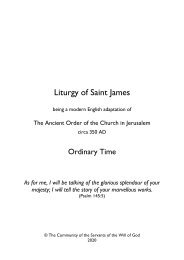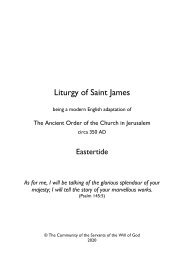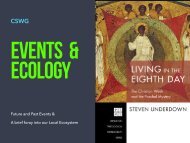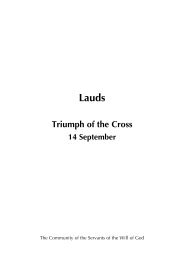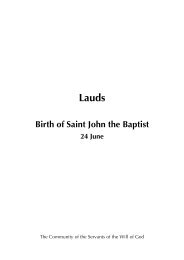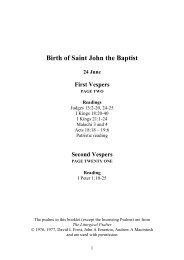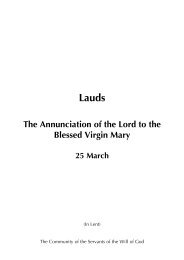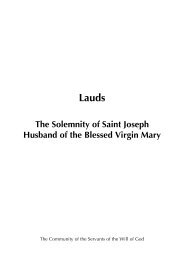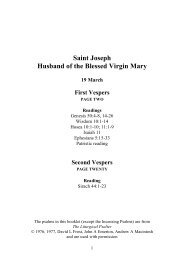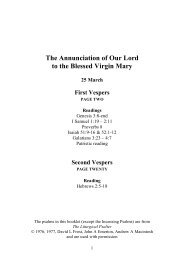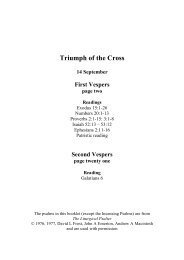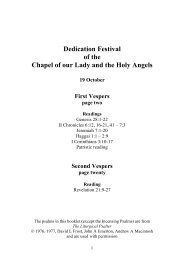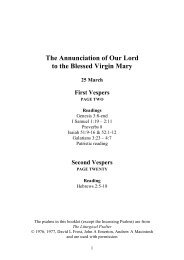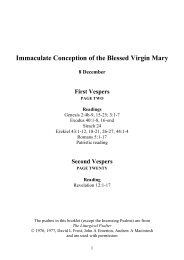Peace in the Face of War
Create successful ePaper yourself
Turn your PDF publications into a flip-book with our unique Google optimized e-Paper software.
Our Associate, Carol<strong>in</strong>e Walton, provides compell<strong>in</strong>g excerpts from her<br />
previously published work on <strong>the</strong> Siege <strong>of</strong> Len<strong>in</strong>grad. She focuses on<br />
manifestations <strong>of</strong> spiritual peace under extreme physical deprivation, <strong>in</strong><br />
this case, mass starvation. Tak<strong>in</strong>g us <strong>in</strong>to <strong>the</strong>atres and along streets to visit<br />
famished actors, craftsmen, artists and musicians, as well as <strong>the</strong> ord<strong>in</strong>ary<br />
people, she documents how, <strong>in</strong> spite <strong>of</strong> <strong>the</strong>ir destitution, some shared <strong>the</strong><br />
little <strong>the</strong>y had. Those who survived and found spiritual peace, she tells us,<br />
were not <strong>the</strong> strongest that looked after <strong>the</strong>mselves, but those that shared<br />
<strong>the</strong>ir t<strong>in</strong>y morsels and <strong>in</strong>defatigable talents with o<strong>the</strong>rs.<br />
The popular Christian social philosopher, Nicholas Berdyaev, writ<strong>in</strong>g<br />
at <strong>the</strong> start <strong>of</strong> <strong>the</strong> Second World <strong>War</strong>, avers that peace is found through<br />
creative acts. For him, creativity is not necessarily artistic; it is even more<br />
importantly social. The emancipation, <strong>the</strong> lift<strong>in</strong>g up <strong>of</strong> those enslaved by<br />
socio-political or spiritual entanglements are for him creative acts. These acts<br />
are accomplished <strong>in</strong> an eschatological frame <strong>of</strong> reference; that is, <strong>in</strong> union<br />
with <strong>the</strong> Div<strong>in</strong>e. Now <strong>the</strong> idea <strong>of</strong> eschatology, or End Time, might require<br />
some unpack<strong>in</strong>g. It presupposes a Div<strong>in</strong>e purpose, an overarch<strong>in</strong>g plan for<br />
creation. That purpose is <strong>the</strong> sanctification <strong>of</strong> humank<strong>in</strong>d: its deification,<br />
or transformation to God-manhood. Now <strong>the</strong> End penetrates all th<strong>in</strong>gs at<br />
all times even though, be<strong>in</strong>g Providential, it is itself outside time and space.<br />
Indeed its accomplishment assumes that <strong>the</strong> world is already encompassed<br />
by Div<strong>in</strong>e reality. The world as we know it will pass away, not physically but <strong>in</strong><br />
its present conceptual order with all its distorted emphases. Yet none <strong>of</strong> this<br />
can be forced: humank<strong>in</strong>d is free to choose. To <strong>the</strong> extent that we let go <strong>of</strong> this<br />
world, its passions and desires, and align ourselves with God’s purpose, we<br />
already enter to some degree <strong>in</strong>to <strong>the</strong> eschatological fulfillment, which br<strong>in</strong>gs<br />
us freedom. But to <strong>the</strong> extent that we hold on to this world and its allures,<br />
that freedom becomes only relative, more an <strong>in</strong>timation than <strong>the</strong> fullness.<br />
Christians believe that Christ palpably brought ‘<strong>the</strong> End’ <strong>in</strong>to ord<strong>in</strong>ary human<br />
time. For Berdyaev, <strong>the</strong> End is experienced through those true creative acts<br />
that lead o<strong>the</strong>rs to freedom. These actions to some degree also br<strong>in</strong>g history<br />
to an end, for <strong>the</strong> historcal narrative is noth<strong>in</strong>g o<strong>the</strong>r than a history <strong>of</strong> war,<br />
<strong>the</strong> cessation <strong>of</strong> freedom. The notion <strong>of</strong> <strong>the</strong> Apocalypse assumes a f<strong>in</strong>al<br />
resistance to Providence, and hence a ‘last battle.’ While Berdyaev does not<br />
discount such, he would emphasise it as a battle for <strong>the</strong> collective soul to<br />
choose <strong>the</strong> good and reject evil. Whatever, war and death paradoxically lead<br />
<strong>the</strong> collective conscious to a sense <strong>of</strong> <strong>the</strong> End. <strong>War</strong>, never to be advocated<br />
or condoned, yet <strong>in</strong>spires people to desire freedom; it also <strong>in</strong>spires<br />
creativity. Such creativity renews <strong>the</strong> world, re-creat<strong>in</strong>g it. On <strong>the</strong> largest<br />
possible scale <strong>the</strong>n, war engages humank<strong>in</strong>d with <strong>the</strong> End, for good or ill.<br />
5



